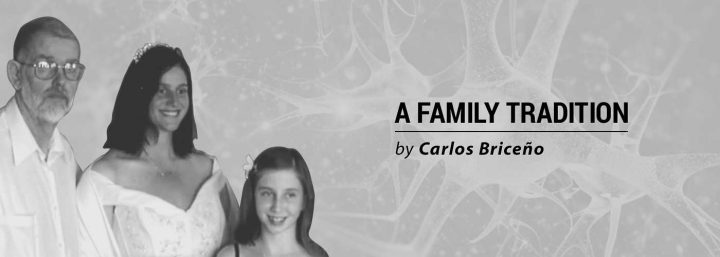Confronting Huntington’s Head-on: My Wife Shares What Makes Her Rare
Written by |

Because Feb. 29 is Rare Disease Day, I thought it would be a good idea to talk to my wife about what makes her so rare.
Jill was diagnosed with Huntington’s disease in 2018. In the U.S., the number of people who have the disease is about 30,000. That statistic alone would make her rare, but I decided to let her explain what makes her rare. Our conversation follows:
CB: The future is not fun for you. What do you think is unique about the way you are handling your diagnosis and all that comes with it?
JB: I’d like to say that I am unique and different, just like everyone else. What I mean by that is that everyone has issues that they have to face, so my issues don’t make me any different than anyone else.
I am surrounded by people who have cancer, autism, multiple sclerosis, depression, and a multitude of other issues, so I understand that we all have our mountains to climb. It helps me remember that I’m not alone.
I can’t say that I am excited about my possible future, but it’s not here, it hasn’t happened yet. So there’s no real reason that I shouldn’t appreciate all that I have now.
What people tell me is that how I handle my diagnosis is unique. I look at every day as a new day. What happened yesterday and what will happen tomorrow does not shape my day today. I try to wake up with the attitude that I will enjoy the day and deal with whatever comes my way with a smile.
When I was little, I heard someone say, “Fake it till you feel it,” so I try to live by that. As dramatic as it sounds, it’s not really a difficult lifestyle. If I wake up in the morning and I’m in a bad mood, I put on a smile and work at being in a better mood. It doesn’t always work, but most of the time it does. I start to forget why I was in a bad mood, and eventually, I’m in a better one.
If I’m short on patience, I work on being quiet and listening. This helps me understand other people’s reasoning for their behavior, which helps me to be more patient with them. If I’m hungry, I yell.
I’ve never heard you yell when you’re hungry.
Well, I just said that to be dramatic.
As if your disease isn’t dramatic enough.
Life is short. You might as well be a little dramatic at times.
What else about you makes you rare?
I want people to understand that Huntington’s is not something to run away from. It’s not something to hide. It’s not something to be embarrassed about. Most importantly, it’s not something that goes away if you don’t talk about it.
So many families are torn apart by this disease. They try to bury it and pretend that it doesn’t exist. That if you just don’t think about it, it won’t creep into your life and become part of it. That’s wrong. So wrong.
It is a part of your life, and not dealing with it makes it worse. It takes all of your fears and twists them into something scarier than it already is. Now, I’m not saying that it’s not scary and life-altering, but I think that ignorance is not bliss in this case.
Talking about it and dealing with it, however bad it may be, is still better than trying to ignore it and hoping it goes away. I know from experience, and I wish that I could make everyone understand that it’s OK to be scared, and it’s OK to want to hide. I did, too, for a while.
But what I’ve learned over the last year is that all the things that made me worried came true, and I’m still here. I still have a life. I still have a family. And I still love my life and family, and you can, too.
Every day I make a choice to deal with my diagnosis head-on and to support others in whatever their struggles may be. I try to share my “fake it till you feel it” philosophy with everyone I come in contact with and remind them that life is what you make of it.
So what I’m hearing in terms of what makes you rare is that despite a terminal illness, you don’t let it get you down.
That about sums it up.
(Jill starts to fake yell.)
Does that mean you’re hungry?
Yes.
Time to end this interview.
***
Note: Huntington’s Disease News is strictly a news and information website about the disease. It does not provide medical advice, diagnosis, or treatment. This content is not intended to be a substitute for professional medical advice, diagnosis, or treatment. Always seek the advice of your physician or other qualified health provider with any questions you may have regarding a medical condition. Never disregard professional medical advice or delay in seeking it because of something you have read on this website. The opinions expressed in this column are not those of Huntington’s Disease News or its parent company, Bionews Services, and are intended to spark discussion about issues pertaining to Huntington’s disease.






Leave a comment
Fill in the required fields to post. Your email address will not be published.